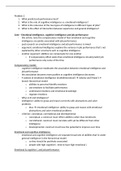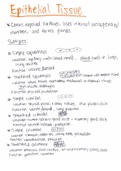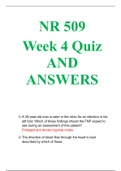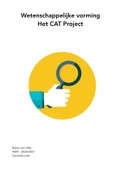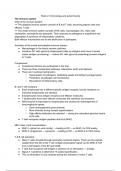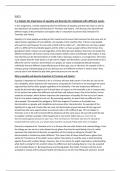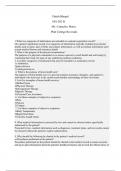Problem 2
1. What predicts job performance best?
2. What is the role of cognitive intelligence vs. emotional intelligence?
3. What is the relevance of the two types of intelligence in different types of jobs?
4. What is the effect of interaction between experience and general intelligence?
Cote – Emotional intelligence, cognitive intelligence and job performance
- this article: tests the compensatory model of how emotional and cognitive
intelligence are jointly associated with job performance
- past research on emotional intelligence and job performance is mixed
- argument: emotional intelligence explains the variance in job performance that’s not
explained by other constructs such as cognitive intelligence
- another argument: abilities can compensate for one another
o if compensatory effect exists then emotional intelligence should predict job
performance only some of the time
Compensatory model:
- cognitive intelligence moderates the association between emotional intelligence and
job performance
- the association becomes more positive as cognitive intelligence decreases
- 4 subsets of emotional intelligence (multidimensional) Salovey and Mayer’s 4-
branch hierarchical model:
o abilities to perceive/identify emotions
o use emotions to facilitate performance
o understand emotions and emotional knowledge
o regulate emotions
- Whys is EI and intelligence?
- intelligence: ability to grasp and reason correctly with abstractions and solve
problems
o thus emotional intelligence: ability to grasp and reason with emotional
abstractions and solve emotional problems
- criterion: conceptual, correlational and developmental
o conceptual: a construct must reflect abilities rather than tendencies
o correlational: construct must correlate with yet be different from other
intelligence
o developmental: construct must have the potential to improve over time
Emotional and cognitive intelligence
- emotional and cognitive intelligence are separate broad sets of abilities that’re under
general intelligence in the hierarchical model
o so they should be positively associated
o people with high cognitive i. tend to have high emotional i.
Emotional & cognitive i. and job performance
, - cognitive i. is positively related to dimensions of job performance – task performance
and organizational citizenship behavior (OCB) – in most jobs
- job performance that’s not attained through cognitive i. may be attained through
emotional i.
o 1st mechanism: expertise at identifying & understanding emotions of others
facilitate coordination & interpersonal functioning and enhance task
performance
information about people’s goals, attitudes and intentions may be
converted to OCB
nd
o 2 mechanism: regulating emotions influences the quality of social
relationships
this may enhance performance via advice and social support
rd
o 3 mechanism: effects of emotions on how people think and act
manage emotions in ways that enhance motivation and quality of
decisions
- emotional intelligence becomes less positively associated with performance as
cognitive intelligence increases
- people who already have high cognitive intelligence emotional intelligence
contributes little to their job performance because they can already achieve high
performance
hypotheses:
- 1. the association between emotional intelligence and task performance becomes
more positive as cognitive intelligence decreases
- 2. the association between emotional intelligence and organizational citizenship
behavior (OCB) becomes more positive as cognitive intelligence decreases
o 2 components of OCB:
o OCBO (organization, contextual) & OCBI (individual)
method:
- 175 full-time employees
- 2 stages of data collection:
o 1. test of cognitive and emotional intelligence (MSCEIT and IQ)
o 2. job performance measure from supervisor
- control variables:
o Psychological: leader-member exchange, big five
o Demographic: education level, number of hours worked per week, occupation
Results:
- hypothesis 1: supported interaction effect between EI and cognitive intelligence
- hypothesis 2: the interaction was found for OCBO but not for OCBI, so the hypothesis
is partially supported
- additional analyses to test mediation:
o no evidence that neither leader-member exchange nor big five traits mediate
the association among cognitive i., emotional i., and job performance
1. What predicts job performance best?
2. What is the role of cognitive intelligence vs. emotional intelligence?
3. What is the relevance of the two types of intelligence in different types of jobs?
4. What is the effect of interaction between experience and general intelligence?
Cote – Emotional intelligence, cognitive intelligence and job performance
- this article: tests the compensatory model of how emotional and cognitive
intelligence are jointly associated with job performance
- past research on emotional intelligence and job performance is mixed
- argument: emotional intelligence explains the variance in job performance that’s not
explained by other constructs such as cognitive intelligence
- another argument: abilities can compensate for one another
o if compensatory effect exists then emotional intelligence should predict job
performance only some of the time
Compensatory model:
- cognitive intelligence moderates the association between emotional intelligence and
job performance
- the association becomes more positive as cognitive intelligence decreases
- 4 subsets of emotional intelligence (multidimensional) Salovey and Mayer’s 4-
branch hierarchical model:
o abilities to perceive/identify emotions
o use emotions to facilitate performance
o understand emotions and emotional knowledge
o regulate emotions
- Whys is EI and intelligence?
- intelligence: ability to grasp and reason correctly with abstractions and solve
problems
o thus emotional intelligence: ability to grasp and reason with emotional
abstractions and solve emotional problems
- criterion: conceptual, correlational and developmental
o conceptual: a construct must reflect abilities rather than tendencies
o correlational: construct must correlate with yet be different from other
intelligence
o developmental: construct must have the potential to improve over time
Emotional and cognitive intelligence
- emotional and cognitive intelligence are separate broad sets of abilities that’re under
general intelligence in the hierarchical model
o so they should be positively associated
o people with high cognitive i. tend to have high emotional i.
Emotional & cognitive i. and job performance
, - cognitive i. is positively related to dimensions of job performance – task performance
and organizational citizenship behavior (OCB) – in most jobs
- job performance that’s not attained through cognitive i. may be attained through
emotional i.
o 1st mechanism: expertise at identifying & understanding emotions of others
facilitate coordination & interpersonal functioning and enhance task
performance
information about people’s goals, attitudes and intentions may be
converted to OCB
nd
o 2 mechanism: regulating emotions influences the quality of social
relationships
this may enhance performance via advice and social support
rd
o 3 mechanism: effects of emotions on how people think and act
manage emotions in ways that enhance motivation and quality of
decisions
- emotional intelligence becomes less positively associated with performance as
cognitive intelligence increases
- people who already have high cognitive intelligence emotional intelligence
contributes little to their job performance because they can already achieve high
performance
hypotheses:
- 1. the association between emotional intelligence and task performance becomes
more positive as cognitive intelligence decreases
- 2. the association between emotional intelligence and organizational citizenship
behavior (OCB) becomes more positive as cognitive intelligence decreases
o 2 components of OCB:
o OCBO (organization, contextual) & OCBI (individual)
method:
- 175 full-time employees
- 2 stages of data collection:
o 1. test of cognitive and emotional intelligence (MSCEIT and IQ)
o 2. job performance measure from supervisor
- control variables:
o Psychological: leader-member exchange, big five
o Demographic: education level, number of hours worked per week, occupation
Results:
- hypothesis 1: supported interaction effect between EI and cognitive intelligence
- hypothesis 2: the interaction was found for OCBO but not for OCBI, so the hypothesis
is partially supported
- additional analyses to test mediation:
o no evidence that neither leader-member exchange nor big five traits mediate
the association among cognitive i., emotional i., and job performance


